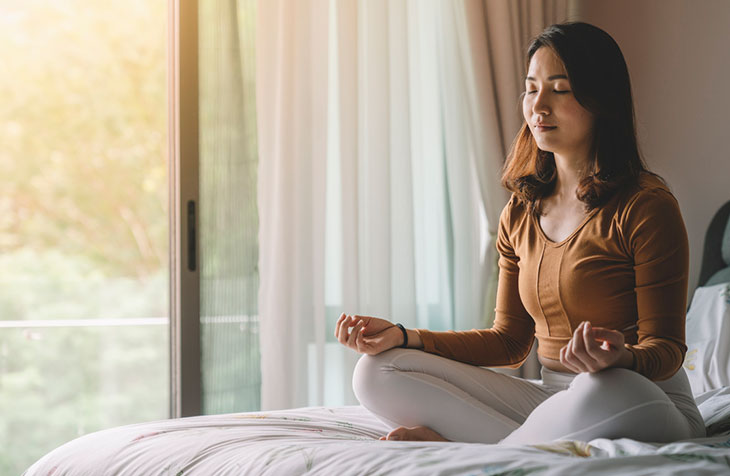Feeling anxious is common, but chronic anxiety can harm your mental and physical health. Prescriptions aren’t the only answer—so what are the treatments for anxiety that don’t involve medication? The good news is that lifestyle changes, supplements, and relaxation techniques can make a big difference. Here, we’ll share holistic approaches to naturally calm your mind and body.
Understanding Anxiety: What Are the Treatments for Anxiety? The Silent Struggler’s Companion
Anxiety doesn’t always look the same—it might be constant worry, restless nights, sudden panic, or even stomach troubles. Your brain is trying to protect you, but when the “danger signal” gets stuck, anxiety stops being helpful and starts taking over.
Many are discovering that daily routines and natural approaches can significantly help manage symptoms. This strategy doesn’t eliminate the need for professional guidance, but creates a more comprehensive wellness plan.
Why Natural Approaches Are Becoming Popular
There’s been a noticeable rise in people choosing integrative health strategies recently. Whether motivated by medication concerns or prevention-focused wellness, natural methods are growing popular. They enhance medical treatments while letting individuals actively participate in their recovery.
Natural remedies offer more than just gentle relief—they typically promote lasting health. They target the sources of trouble—whether it’s poor recovery, chronic pressure, or nutrient gaps—areas where drugs alone often fall short.
Nutrition as a Natural Tool for Calming the Mind
There’s a strong connection between your gut and your brain. Because of this, what you eat can directly affect your anxiety levels. Omega-3 fats—found in foods like salmon, sardines, and flaxseeds—are known to reduce inflammation and help keep your brain functioning well.
Eat Foods That Soothe Your Nervous System
Foods rich in magnesium—like leafy greens, avocado, and dark chocolate—help soothe the nervous system and relax the body. At the same time, fermented foods like yoghurt, kimchi, and kefir nourish gut bacteria linked to better mood and less anxiety.
Avoid Stimulants and Sugar Spikes
Foods rich in magnesium—like leafy greens, avocado, and dark chocolate—help soothe the nervous system and relax the body. At the same time, fermented foods like yoghurt, kimchi, and kefir nourish gut bacteria linked to better mood and less anxiety.
Instead of sugary snacks, choose protein-packed snacks like nuts or boiled eggs to help maintain steady blood sugar and a calm, focused mind.
Exercise for Emotional Resilience
Exercise isn’t only for physical health—it’s also a natural mood booster. Just a quick 20-minute walk can release endorphins, the body’s own “happy” chemicals. That’s why regular movers often feel less stressed and emotionally stronger.
Yoga blends gentle movement with mindful breathing. Together, these practices help relax the nervous system and teach the mind to manage stress in a healthier way.
Breathwork and Deep Breathing Exercises
Your breath works on autopilot, but controlled breathing activates powerful stress reduction. Techniques like box breathing (inhale-hold-exhale-hold for 4 counts each) tell your nervous system to chill out. Research shows this lowers heart rate, decreases blood pressure, and interrupts anxiety cycles effectively.
Herbal Remedies With a History of Healing
Chamomile and Lavender
Chamomile tea is a time-tested remedy for relaxation and better sleep. It contains antioxidants like apigenin that gently bind to brain receptors, helping reduce anxiety.
Lavender is also a natural stress reliever. Used in oils or baths, its scent lowers cortisol, and a few drops at bedtime can quiet your mind and body.
Ashwagandha and Adaptogens
Used in Ayurvedic healing, ashwagandha is a powerful adaptogen that helps the body adapt to stress. It’s believed to support healthy cortisol levels, the hormone linked to stress.
Rhodiola and holy basil are other adaptogens that may help lift mood, sharpen focus, and raise energy in people facing long-term stress.
Mindfulness, Meditation, and Mental Clarity
Embrace the Present Moment
Often, anxiety is fueled by fears about the future or regrets from the past. Mindfulness helps redirect attention to the current moment. Using tools like deep breathing, body awareness, or meditation, you can reconnect with the now.
Doing this regularly can quiet overthinking and build emotional resilience. In fact, it can physically alter brain regions tied to stress and self-control.
Journaling and Gratitude Practices
Journaling your thoughts and worries can be a powerful way to clear your mind. It helps you sort through emotions and see things more clearly. Similarly, noting daily gratitudes shifts your mindset from stress to appreciation.
Even listing three positive things each day can improve your outlook and ease daily tension.

Sleep Hygiene: The Overlooked Remedy
Create a Relaxing Bedtime Routine
Sleep often gets ignored when managing anxiety, but it’s a major piece of the puzzle. A lack of rest can heighten emotional ups and downs. That’s why building a calming nighttime routine is so helpful.
Try lowering the lights, shutting off electronics, sipping herbal tea, or reading before bed. Regular sleep habits—like waking and sleeping at the same time—can really improve rest quality.
Limit Nighttime Stimulation
Besides limiting blue light at night, it’s best to steer clear of caffeine, large meals, or tough workouts before bed. Keeping your room cool, quiet, and tidy can also help you wind down more easily.
Connection, Nature, and Digital Detox
Human Interaction and Support
Spending a few minutes talking to someone you trust can ease feelings of stress and loneliness. Sharing your worries out loud often makes them feel more manageable. For extra support, joining a group—even online—can bring comfort and helpful advice.
On the other hand, feeling isolated and constantly comparing yourself to others online can increase anxiety.
Time in Nature and Unplugging
Getting outside in natural light helps reset your internal clock and increases vitamin D, both of which are good for your mood. A stroll in the park, a bit of gardening, or sunbathing can bring a sense of calm.
It’s also wise to limit screen time. Nonstop digital input can overstimulate your senses and raise anxiety. Stepping away regularly helps restore balance.
When to Seek Professional Help
While natural methods can be very helpful, they may not work the same for everyone. If anxiety continues, disrupts your routine, or causes panic, it’s best to speak with a licensed mental health expert.
Working with a therapist allows you to uncover underlying causes and build tools that suit your needs. Sometimes, natural remedies can be paired with therapy or medication for well-rounded support.
Holistic Practices: A Blend of Ancient and Modern
Western medicine often targets symptoms directly, while traditional approaches aim to restore balance and prevent illness. Techniques like acupuncture, sound therapy, and energy healing can help ease anxiety naturally.
Such therapies activate the body’s natural healing response, creating feelings of calm and inner balance.
One Step at a Time: Your Path to Calm
Adding just a few of these practices to your routine can make a big difference. Whether it’s taking a short walk, journaling at night, or opting for herbal tea instead of coffee, small changes really add up.
Above all, be kind to yourself. Healing takes time and isn’t something that happens overnight. Gradually, your body will learn to relax, and that sense of calm will become more natural.
A Subtle Shift with Natural Remedies for Anxiety
Modern medicine certainly has its place, but nature’s gentle power can bring its own sense of comfort. With practices like mindful eating, physical movement, herbal remedies, and emotional care, many people find lasting peace.
Turning to natural remedies doesn’t mean rejecting treatment—it’s about exploring every option for a calmer mind. When we reconnect with nature and our inner selves, we often discover resilience we didn’t realise we had. If you’re wondering, what are the treatments for anxiety? It’s about a blend of conventional and natural approaches.



